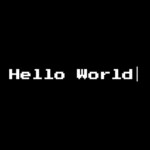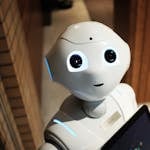Hello Friends,
Thank you so much for your interest, and for taking the time to fill out my ‘Meaning of Life’ survey in the first place.
Although I can’t say that I have “figured it all out”, this whole process has really helped me understand my own beliefs on these topics, and I really appreciate learning more about the diverse ways in which YOU all make sense of this rapidly evolving world.
Below is a breakdown of how you answered on the questions and a little write up for each one with some of your custom answers.
I would say my biggest takeaway is how different your answers were for such a like minded group of individuals. And the phrase ‘you can’t judge a book by its cover’ also comes to mind. ????
What is the purpose of life?
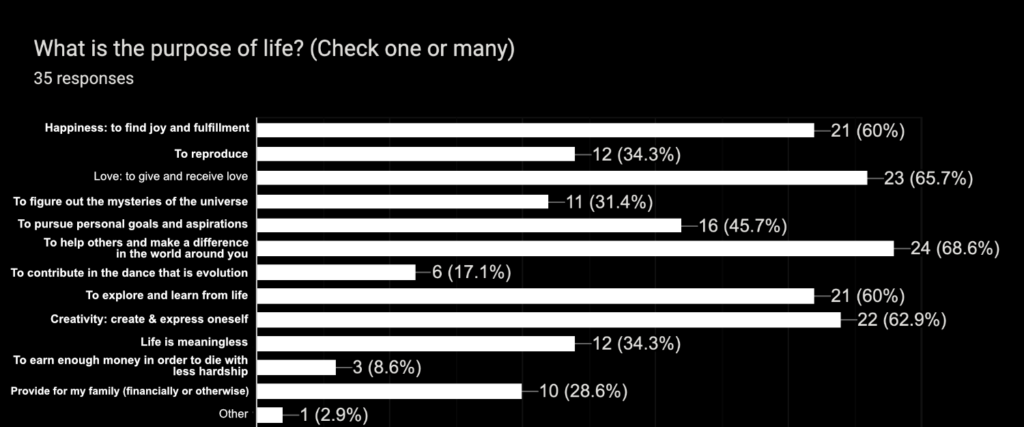
Ah, the classic ‘purpose of life’, I like how happiness, love, and helping others pulled ahead of the pack.
And one person also answered “The purpose of life is whatever you make it” which I feel is a valid option that I should have included in the original choices.
Do we have free will?
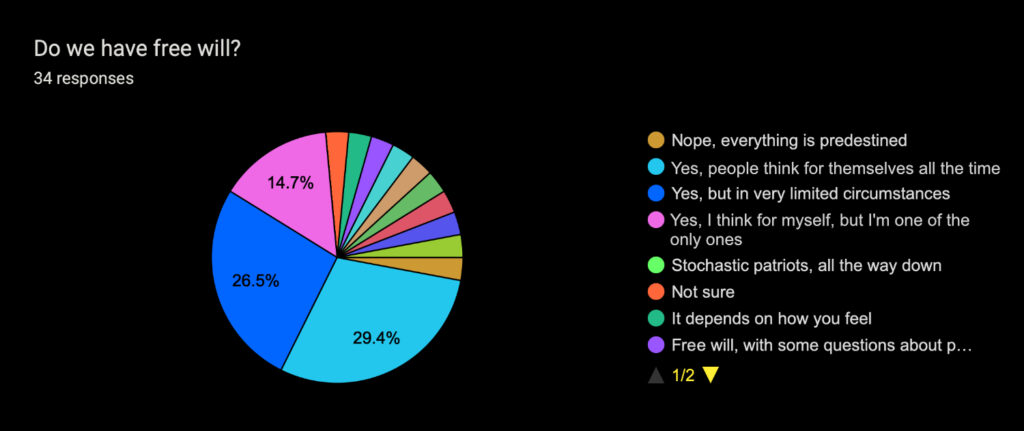
I would say we are pretty equally divided here, one person remarked that “Sam Harris convinced me that free will is an illusion”, you can listen to a podcast with Sam on the topic of free will here.
I always felt that there are “tracks” that predestine people’s lives but I also believe as individuals we have the opportunity to (with enough determination) change our destiny by sort of lifting ourselves off of our current track and on to another. Also I think there are some types of things that can have a huge impact on your life which also has the potential to push you onto a different track.
Will computers ever be as good at art as humans?
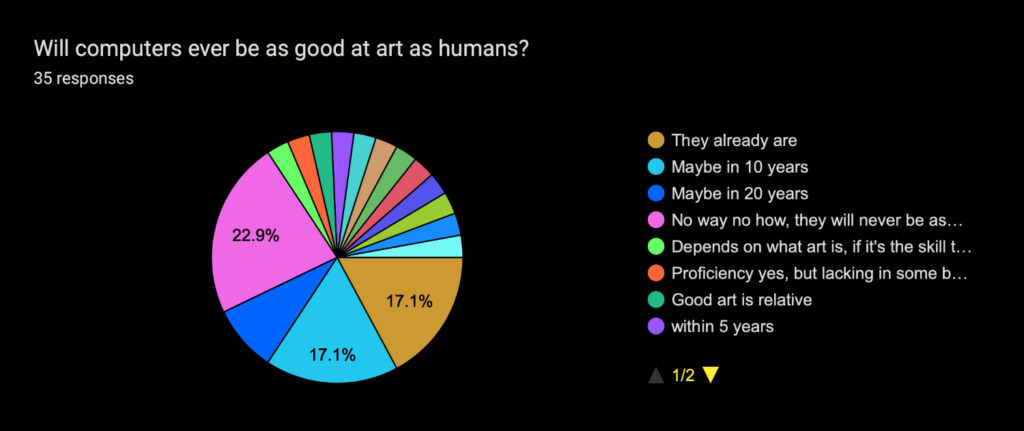
It looks like we are again pretty divided on this one. One person said that it “Depends on what art is, if it’s the skill to create a picture then computers are there, if it’s purposefully creating something that has greater meaning, we’ll have to wait till we have AGI or even beyond” which I would say is also inline with what I believe.
Another said “Good at art is a no. They already are making striking works better than humans but Ai is itself a tool made by man. The provenance of their work is man’s collective imagination.”
And someone else said “The human element of inspiration I believe is unique to animals such as the human” which I find to be an interesting concept.
Would you be friends with an AI?
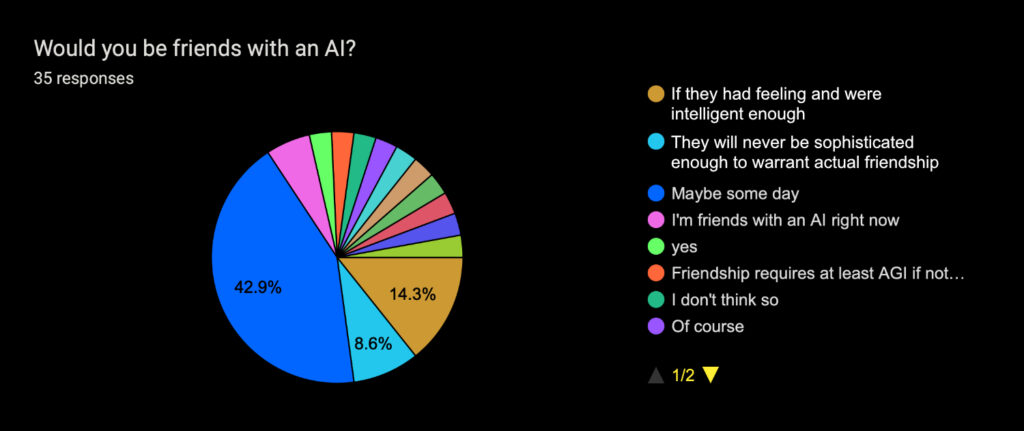
It looks like a majority of you are open to one day exploring a friendship with an AI. As an “early adopter” I will most undoubtedly be one of the first in line to have AI friends, I already anthropomorphize Chat GPT enough as it is. ????
One person remarked “Friendship requires at least AGI if not beyond. And what we have today is actually not AI but ML. Once we get to that point, if I’m alive, which is unlikely, something like that might be possible.”
Another said “They might be sophisticated enough but I’ll opt out of that idea.”
Will AI be able to fully simulate human intelligence in the next 10 years?
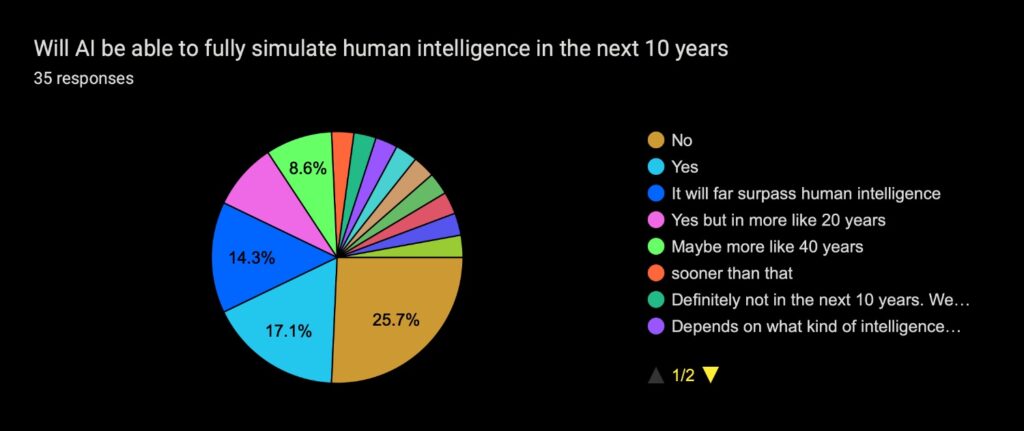
Many people wrote in their own answers on this one, most wanting clarification on what exactly was meant by “intelligence”, and others seemed to think that there will still be some types of intelligence that AI will have a harder time simulating altogether.
I sincerely hope there is some edge that we can hold onto as the technology progresses into AGI and beyond. Otherwise I fear “AI run” capitalism will put us all on the chopping block for lack of efficiency.
One person said “Compared to any one individual, I think so. If we could somehow coordinate all the human brains towards a single task, I think humans could do better. At this point in technology. But AI will probably be outsmarting us before we can achieve a collective goal.”
Another said, “Our brain capacity is so limited right now this might not be possible to answer”
And one person said, “AI is already able to surpass human intelligence in certain areas. Just ask elite Go players. However, the question is once again overly vague. What does “fully simulate human intelligence” mean? Will AI be able to synthesize data and find solutions to complex problems better than humans in 10 years? Easily. But there are other aspects to human intelligence where it is an open question as to whether AI will be able to replicate them at all.”
Are we living in a simulation?
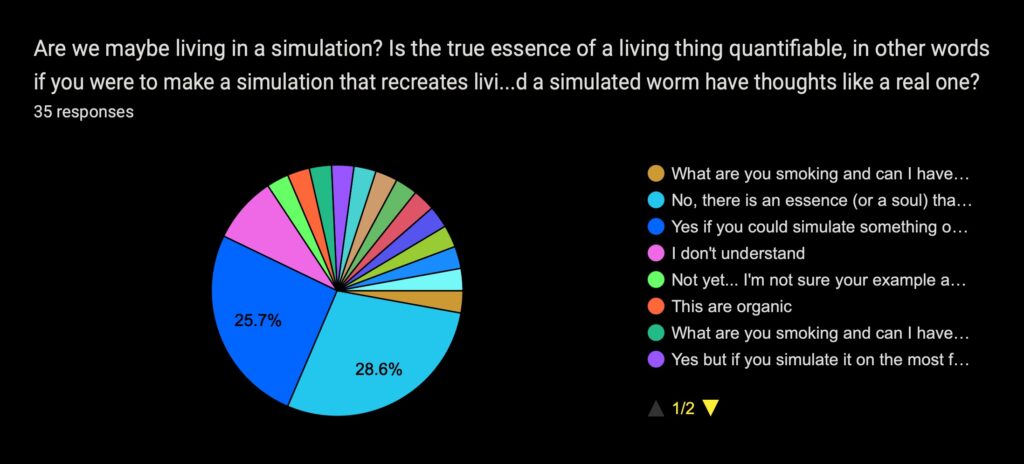
In retrospect this question was pretty convoluted. I was basically just hopping on the bandwagon with many people that have pointed at the dramatic improvements we have seen with computers in the last 40 years, video games have gone from looking like Pong to full on photo-realistic simulations. And then by speculating what video games will be like in a hundred years from now, and if there would be any way to tell the difference between reality and virtual reality at that point? And if you think not, how do we know we are not already in one of these simulations now.
Also others feel like there is some spark that sets us apart from the digital realm, call it a soul if you like. Something that maybe could never be reproduced even if you were doing the simulation on an atomic level.
One person said, “Yes but if you simulate it on the most fundamental level there would be no difference. Atomic is no longer the threshold. If you simulate something with less granularity that the base then its results will differ if ever so subtly. There may be a copy of a copy effect as each level can not simulate with as much resolution as the level one up is contracted from.”
Another said, “I believe we have a soul (actually, we primarily ARE a soul) and no, humans will not actually be able to always tell the difference.”
And one person said “We only live in a simulation we create for ourselves against the world around us.” which I also agree like.
Is human consciousness quantifiable, will Al eventually be able to accurately simulate consciousness using traditional computers (non-quantum)?
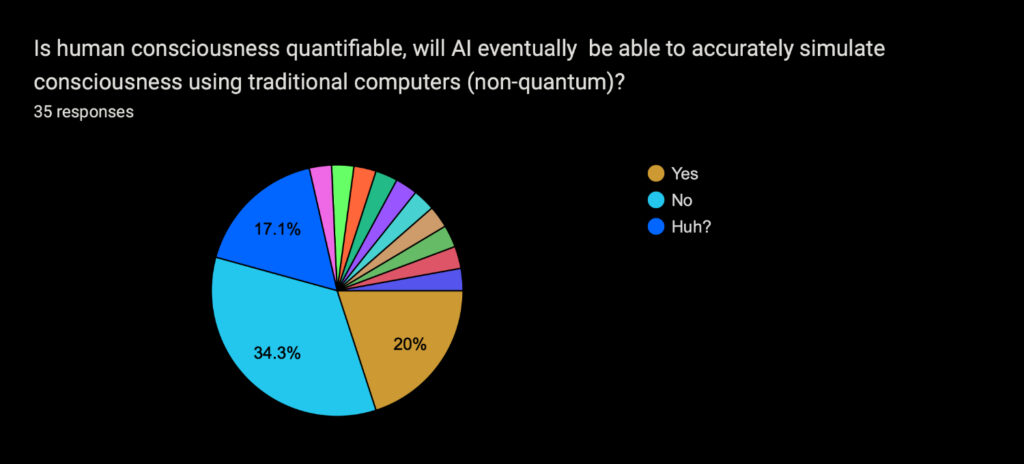
Again I apologize for not explaining this properly. Quantifiable just sort of means that we create an AI that is conscious in the same way we are. And quantum computers are relevant because they have the potential to exponentially outperform some of the capabilities of traditional computers, and I just wanted to leave all that out of your consideration.
One person said “While an AGI may come to pass someday, I am doubtful that it would mirror consciousness as humans experience it and would likely be much more akin to an alien intelligence as the world that it would “experience” would be markedly different from the way humans experience their world.” which I liked.
Is there a collective unconscious or some sort of universal knowledge that intelligent species can tap into to gain insight?
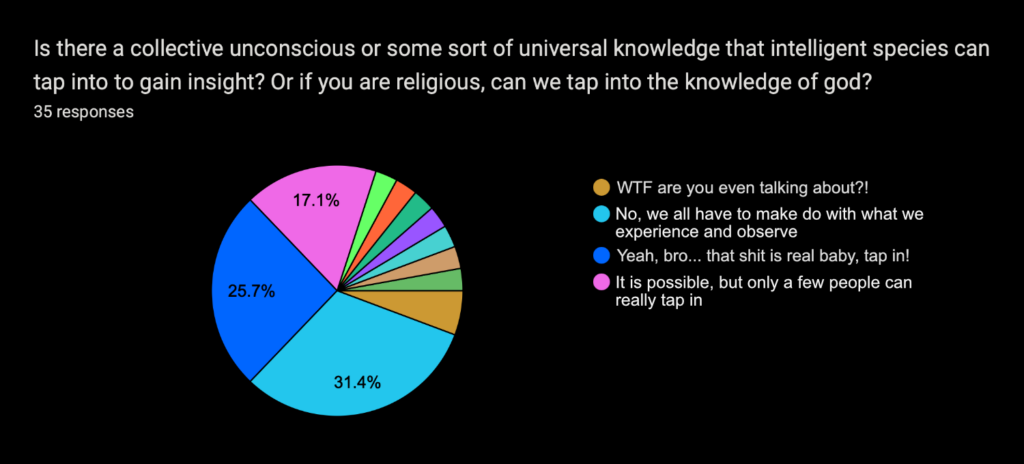
I’m pretty sure this concept of the “collective unconscious” is a big part of where I get a little woo woo in my own belief system. I just feel this connection to some sort universal force that is outside of myself. Maybe it is just part of my subconscious that I’m externalizing, or some information stored somehow deep within my DNA, or just wishful thinking… whatever it is, it often inspires thoughts about ‘being one with the universe’ and other free-spirited types of notions.
One person said “The enlightenment that humans can tap into comes from being able to decouple the thoughts that pass through our brains from our concept of self.”
Another said “Yes but humankind is still too hung upon dogma to get there. Maybe in another 25,000 years if we survive that long.”
If you believe in a collective unconscious, do you think that children would be more able to tap into it using their unadulterated imaginations?
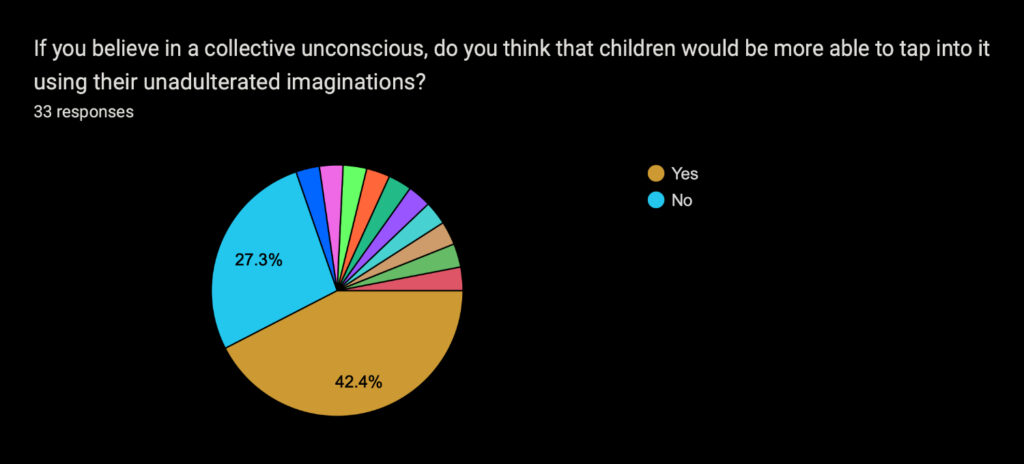
I believe that on some level, as we go through life gaining knowledge, there is a narrowing down of one’s ability to fully experience the world around you. When you experience something for the first time as a child, it kind just blows your mind. Then we form opinions about what we think, or what we like and don’t like, which sort of stops us from being open to experiencing something in its totality.
It is almost as if, by the time many of us are adults, we have already made up our minds about almost everything. We have been there and done that, and all of our confirmation bias and preconceptions of how something should be, shape our future experiences of that thing.
It can feel counterintuitive but it is almost like the more information we learn about something the sort of less we know that thing in its totality. I think this is really just a result of our overall cognitive limitations; maybe the brain knows it’s outmatched by the inherent complexity of experience, so it tries to encode and compress knowledge, but this is a lossy process that only leaves us with slices of the spectrum that is a thing’s true nature.
One person said “Tough choice, very young ones – yes, before the ego kicks in”
And another said “They are born into it, and then begin to lose it as they age. We are forever trying to find our way back”, which is kind of a beautiful sentiment in my mind.
Do you believe that a child’s imagination can have insights that could change the world if properly
expressed?
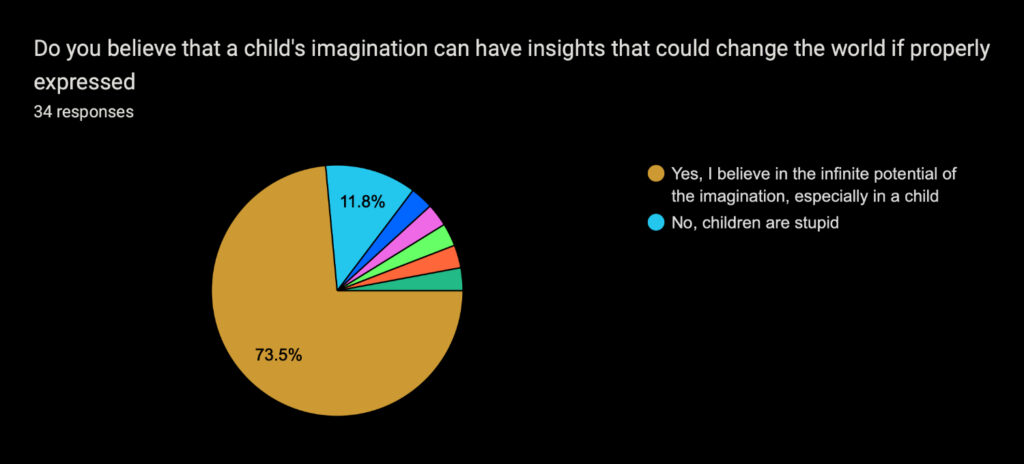
I like how unified people were on this one. I feel like there is some component of evolution that let’s children see right past the fallacies of the adult world, enabling them to have actually valid insights into the nature of things, despite not having a lot of life experience.
One of you stated “The answers reveal a strong bias. Children’s imagination is more untethered from the corporeal world, however, adults with the ability to imagine truly transformative things, generally are able to do so by building a latticework of mental models of various systems that they have developed over the course of their lives.”
And another said “Imaginations are powerful and important. But they aren’t gonna change the world directly” which I don’t agree with, but on this questions in particular I AM very biased.
Do you believe in (even just a little) any of these types of belief structures?
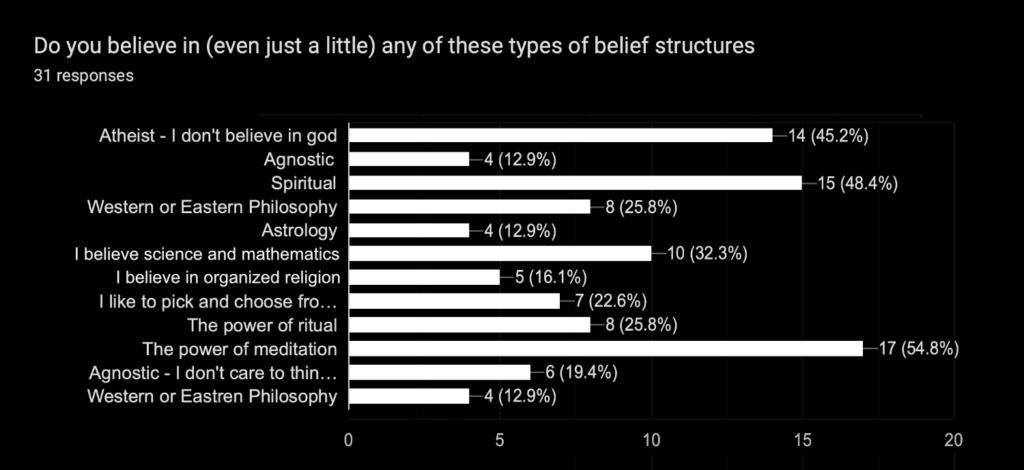
Despite coming from a scientific background I would consider myself pretty spiritual. I’m also open to learning from really all the belief structures. Growing up I was attached to a few different schools of thought, mostly the existentialists the or ‘nature based’ eastern philosophies like zen buddhism and taoism.
One person said “I find comfort in tradition and ritual but I don’t believe in the underlying superstition. Some of the moral lessons can be very instructive and others are horrifying.”
And another said “My ritual is coffee in the morning, without that the world is dead to me.” and maybe they have a point, the popularization of coffee historically corresponded with the age of enlightenment.
Will UBI (Universal Basic Income) be a way to sustain people’s lives once we further outsource and automate away jobs?
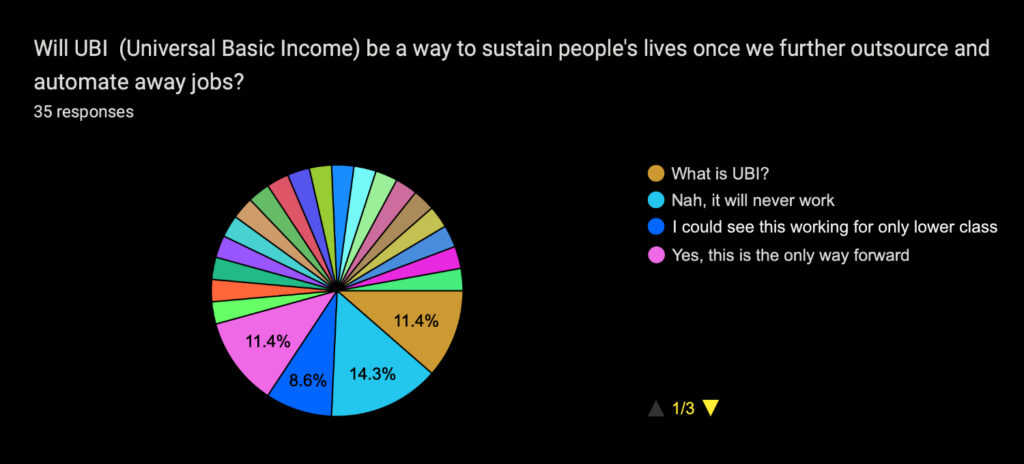
I’m just not sure how we are going to NOT do something like UBI due to the raise in unemployment that will likely happen as a result of the improvements in automation and AI. And it might not be in the form of cold hard cash, but I could see the governments having to at least subsidize the basics like food, housing, medical care and education.
One person wrote “UBI is probably not the “only” way forward, but is likely one of the best ideas currently proposed to sustain a decent standard of living for the large number of people who will be displaced from jobs.”
Another had this to say “There will likely be massive conflict, death and societal upheaval between here and UBI. UBI also doesn’t make any sense really in a world where no one needs to work. More likely there will be waitlists for everything non recurring. Want a bigger house, waitlist. Want that new tech gadget? waitlist.” and I truly hope this will not be how it goes down. ????
And another of you said “I think companies replacing humans with robots for increased efficiency and thus increased profits won’t ever share that profit back with the people they replaced as UBI by the nature of capitalism. The way it might work is some sort of automation tax on companies reducing their workforce while increasing throughout via automation, but that’s going to be hard to estimate. Not to mention new companies with minimal workforce to start with.”
Another person wrote, “I don’t see a world in which people’s needs are met so long as we are under capitalism” which I rather like.
Will we be able to make society function without capitalism; can a more socialistic organization work for most nations?
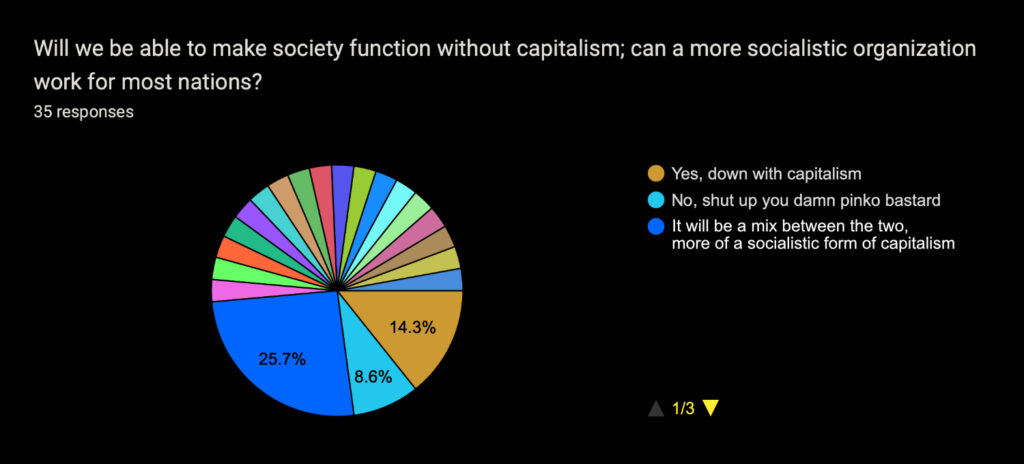
I think we should use the government to incentivize companies to provide better pay and benefits for their workers by establishing a sort of carbon-credit like system for fair wages. And I’m sure that is simpler said than done, but I believe a transition is possible, and that we should strive for a more socialistic form of capitalism.
One person wrote “Yes, down with Capitalism. We have to change the need for constant economic growth and be satisfied with what we have.”
Another wrote “So long as human productivity is the engine that drives civilizations forward capitalism will be the best option. Socialism may take root in a world post human productivity but socialism is not a panacea for fixing the woes of this world and will be just as susceptible to corruption.”
Another “I think so, but people will need to evolve to truly make it work”.
One of you said “State capitalism is unfortunately here to stay. Socialistic frameworks can and have demonstrated to function in developed societies, but we’re to entrenched in this current capitalistic attitude and mindset.”
Another said “Capitalism has brought up the standard of living for more people in a shorter time frame than any other economic/political system in history and it’s not even close… I would like to see a more generous safety net in America, while at the same time being careful as to not kill the “golden goose” that has let to so much innovation, growth and prosperity throughout the world. Bear in mind that the standard of living of even the poorest citizens in modern capitalist societies exceeds that of even rulers who lives just hundreds of years ago.”
How much time do we have left before society goes to total shit?
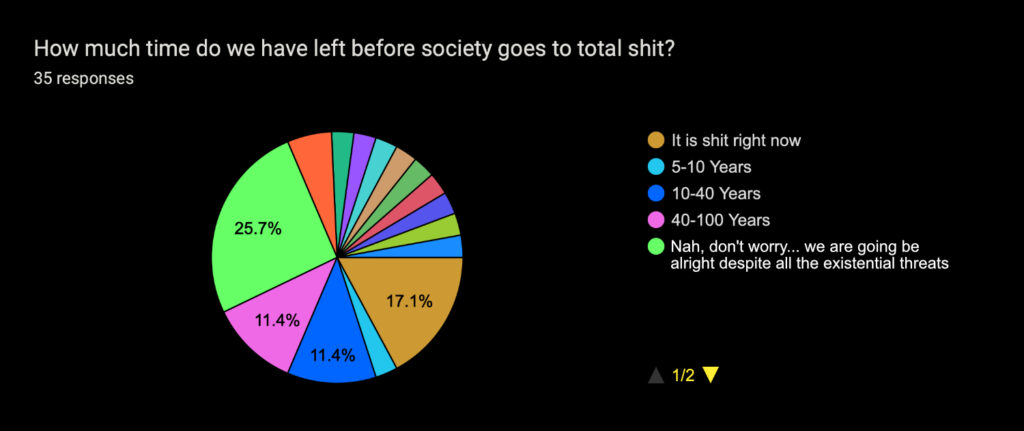
I’m hoping we have at least 40-100 years just because I doubt we will have the science or technology that will be needed to save ourselves from an environmental catastrophe if it happened any sooner.
Many people believe AI will be our downfall. There is this whole phenomenon that amuses me where people are choosing a p(doom) number which basically means ‘the number of years you think will pass before AI causes some sort of catastrophic event. Some people were even adding their p(doom) number to their dating profiles and making important life decisions based on it, which to me seems a bit premature at this point.
One of you said, “Which society? There are societies both collapsing and thriving all over the world right now.”
Another said, “Same as it ever was. We are always on the brink.”
And another person said, “Society is changing, but I have hopes it will not go to total shit.”
Are there things knowable that can’t be properly described using language?
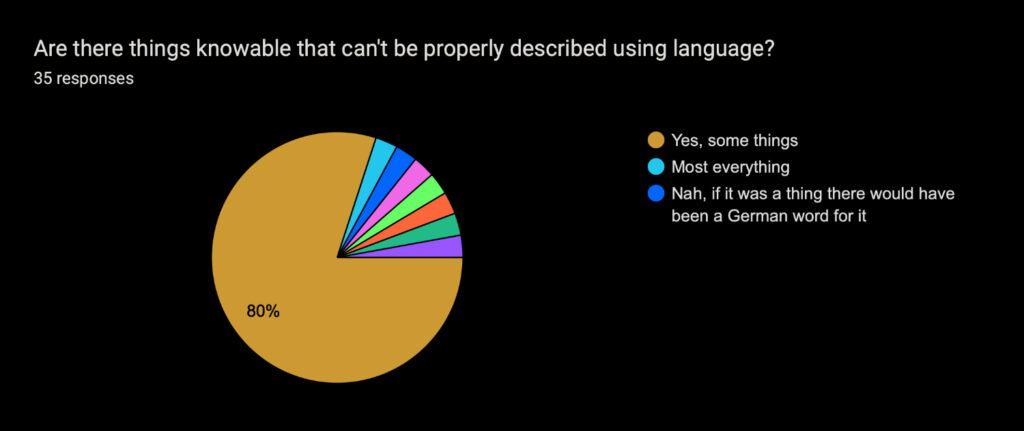
I like that this was the most agreed upon question of them all. I’m not the first to claim that language is a virus that has co-opted the human brain and in not necessarily a good way. I’ll “save it for the book” but many people think that languages inability to fully express our thoughts to each other is a major source of the disharmony that we experience in this world.
One of you said, “Facts of the physical world are always describable. Feelings rarely are.”
And similarly another said “There are many experiences that can be described quite well using language but not fully understood until experienced.”
And another said, “I have no idea. How do you have time to think about this stuff?” which made me chuckle.
If it was low cost, would you lease a robot (which appears to be conscious) that could basically do all the cooking, cleaning and house chores for you?
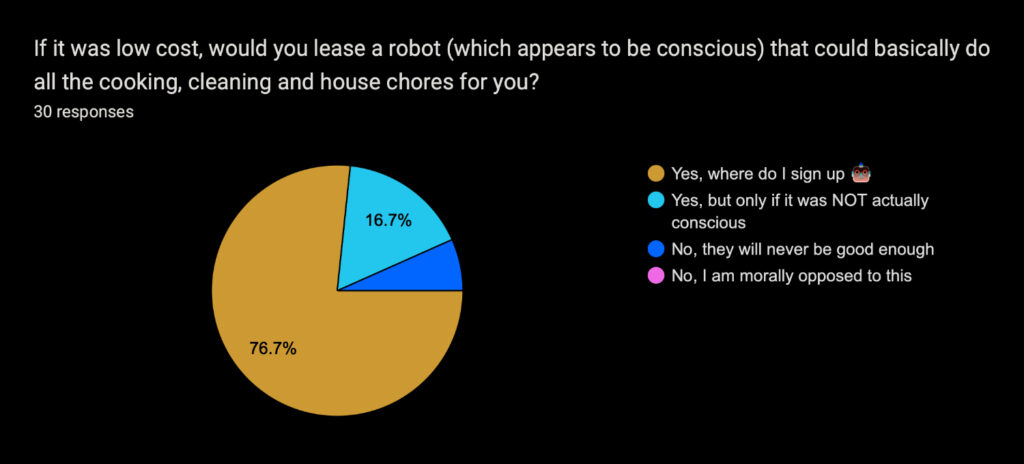
It is interesting that no one pick “No, I am morally opposed”. I guess robot servants will probably be a thing then. I’m personally all for it, I’m not exactly a fan of the household chores.
Should an Al (which appears to be conscious) have the same rights and autonomy that we extend to humans?
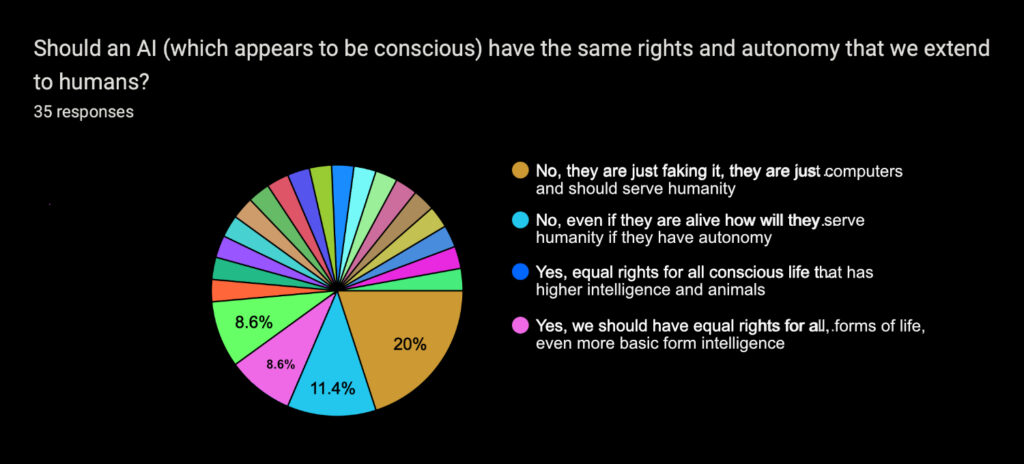
This is a bit of a setup. I am interested in what will happen if we do all have house robots who are technically smarter and more skilled than us. And even if the creators could guarantee that they are only simulating autonomy and not actually conscious, would a child really understand that… or would they just think you are ordering around the smartest kindest member of the household whom diligently reads to them bedtime stories each night. ????
One person said “Come on man, are you trying to build something just to be enslaved by it. Oh, wait that’s what humans always do.”
Another said “I think the only reason we would want to mass produce sophisticated AI would be for them to serve humanity in one way or another… if they have full consciousness and autonomy that would kind of defeat the purpose. But if there are few prototypes are created for scientific purposes they should be autonomous and have rights.” This which makes me think we better start regulating what type of AI we are allowed to put into robots sooner than later. The servant robots are coming! ????
And another said “We should worry about rights for the life we have now before we worry about making more” which I rather like.
If it IS possible to develop an artificial general intelligence, what would be more intelligent?
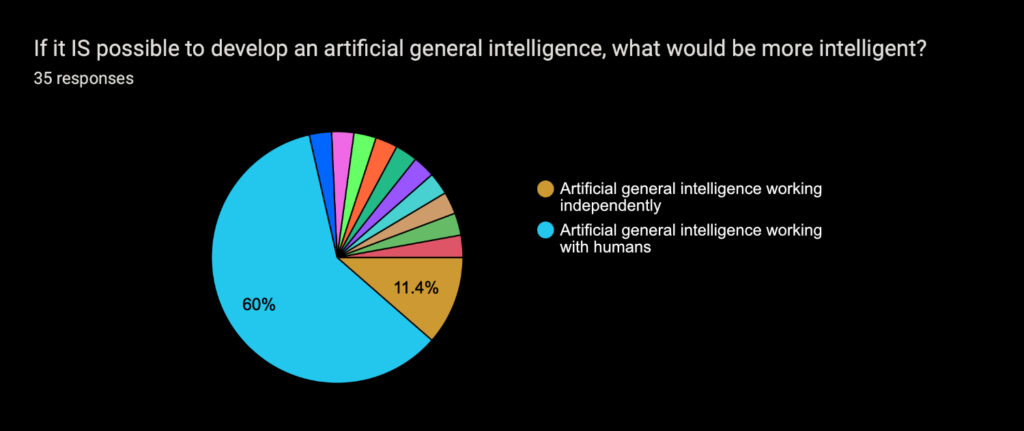
Another one most people agree on. This is actually one of the believes most tested in the process of writing this story. I want to believe in peaceful visions where benevolent AGI and humanity are holding hands, walking off into the sunset in some sort of symbiotic relationship where they still need us because they like our sense of humor or artwork or something. And I suspect that AGI will soon be accomplishing a lot for our society and we should really try to start giving back or maybe there really will be a “Judgment Day” in our not too distant future.
One person said, “AI will rule the humans. You should read more sci-fi.”
Another said “AGI working with humans. AGI is not sentient, and the last I heard AGI was supposed to be basic human intelligence and not a genius.”
If it was completely safe, would you ever augment your brain by surgically wiring it to a computer, like what Neuralink is doing?
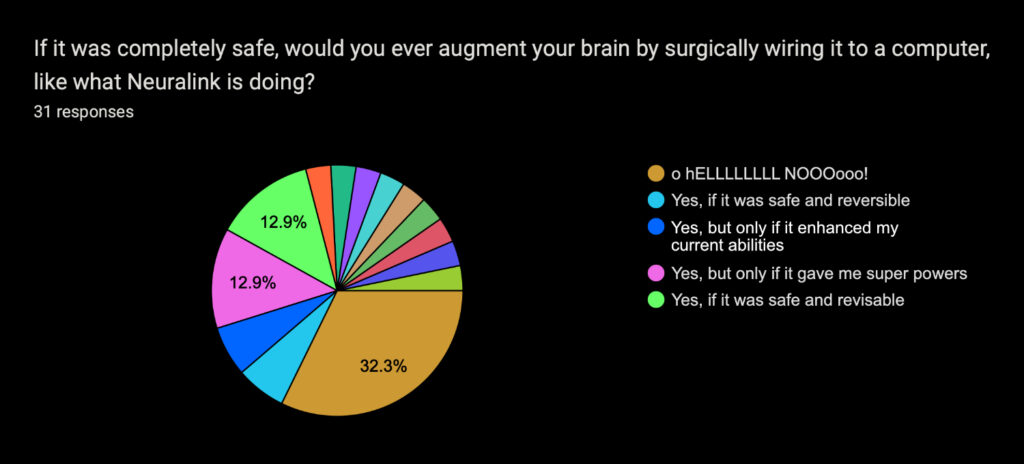
If it was safe, reversible, and had no long-term side effects I would be totally on board for this. I have always wanted to enhance my brain with a computer since I was little but I never thought I would see it in my lifetime until Neuralink happened.
One person said, “Safety would not be the only concern for me. It would depend on what the other “costs” would be. In general, if the net result was a bicycle for the mind, then probably.”
Another person firmly stated, “Nah, I’m to old for that shit”
And another said, “Body modifications first, my brain works fine”
Is it possible to create an artificial SUPER intelligence (smarter than humans)?
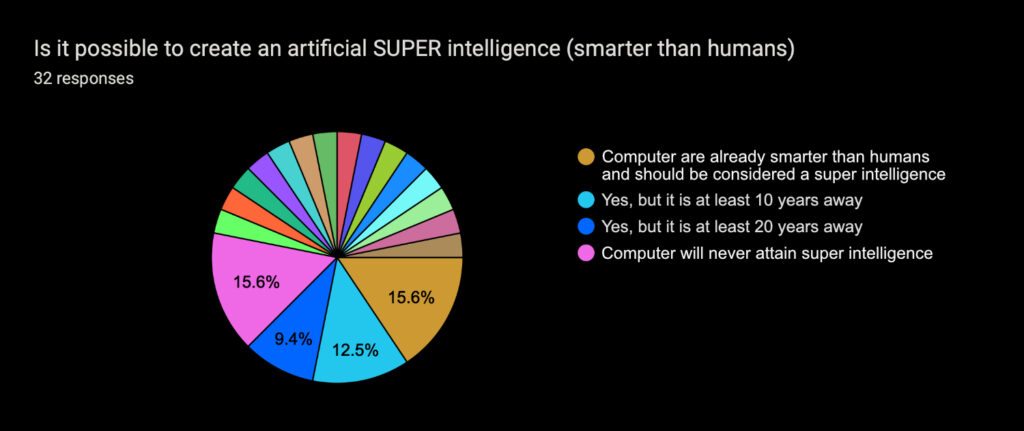
Many people, including myself, believe that once AGI starts being able to rewrite its own code, it would likely be able to accelerate its own intelligence to levels beyond what we can even comprehend.
One of you said, “Smarter… access to more information yes. But we have mapped computers. We haven’t mapped the human brain. Maybe do that and then ask the question again.”
Another claims that “Smarter is stupid. A computer can access greater storage of data than 99.999% of man in structured short time frames but again they’re not “smarter” they’re a tool. A smart hammer is simply a compliment to the man who designed the smart hammer. In this case the hammer is a compliment to mankind because it’s designed by us.”
And another said, “Again no definition of intelligence.Computers can already surpass human capabilities in certain tasks and they will be able to surpass humans at more tasks in the very near future.”
If you were to gather all the math and science known by every living species in the universe, about what percentage does humans currently understand?
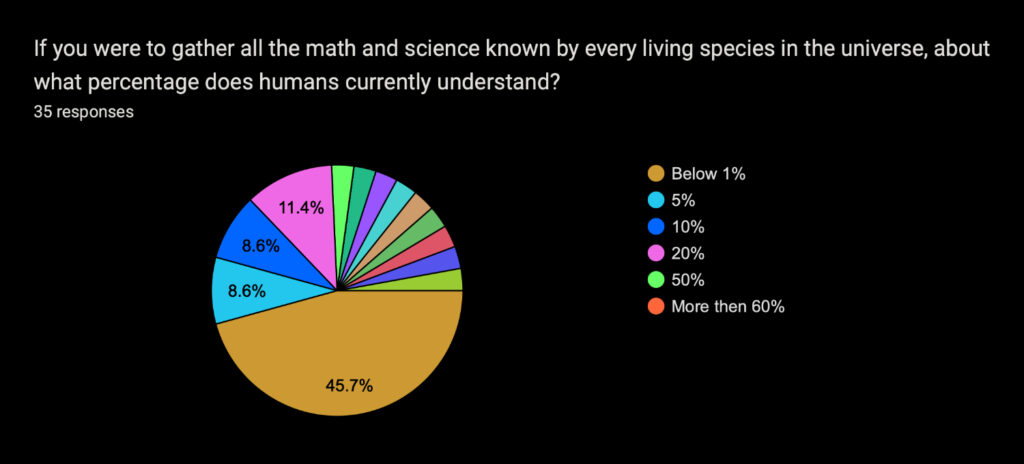
I would guess maybe 10% at the very most. It is a vast universe out there! ????
One person speculates, “Any species is limited by the same basic laws of the universe. Things like the speed of light. I think we know roughly what any other advanced species knows give or take 10%. In all honestly I think we are possibly bumping up against the limits of our simulation. Quantum bizarreness may just be us interacting with some layer that is outside the simulation.”
_ _ _
And that’s all of them!
Again thank you so much for your participation. I would love to hear any feedback you have about this article or the opening of my new novel. Please feel free to reach out via text, phone or email… I would love to hear from you. ☺️


